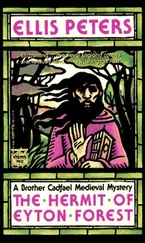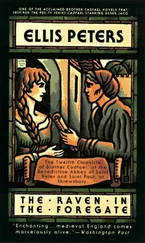Ellis Peters - The Virgin in the Ice
Здесь есть возможность читать онлайн «Ellis Peters - The Virgin in the Ice» весь текст электронной книги совершенно бесплатно (целиком полную версию без сокращений). В некоторых случаях можно слушать аудио, скачать через торрент в формате fb2 и присутствует краткое содержание. Жанр: Старинная литература, на английском языке. Описание произведения, (предисловие) а так же отзывы посетителей доступны на портале библиотеки ЛибКат.
- Название:The Virgin in the Ice
- Автор:
- Жанр:
- Год:неизвестен
- ISBN:нет данных
- Рейтинг книги:5 / 5. Голосов: 1
-
Избранное:Добавить в избранное
- Отзывы:
-
Ваша оценка:
- 100
- 1
- 2
- 3
- 4
- 5
The Virgin in the Ice: краткое содержание, описание и аннотация
Предлагаем к чтению аннотацию, описание, краткое содержание или предисловие (зависит от того, что написал сам автор книги «The Virgin in the Ice»). Если вы не нашли необходимую информацию о книге — напишите в комментариях, мы постараемся отыскать её.
The Virgin in the Ice — читать онлайн бесплатно полную книгу (весь текст) целиком
Ниже представлен текст книги, разбитый по страницам. Система сохранения места последней прочитанной страницы, позволяет с удобством читать онлайн бесплатно книгу «The Virgin in the Ice», без необходимости каждый раз заново искать на чём Вы остановились. Поставьте закладку, и сможете в любой момент перейти на страницу, на которой закончили чтение.
Интервал:
Закладка:
“She will be eighteen very shortly, I do not know the precise day. Darker than her brother, almost black of hair and eye, tall, vigorous… They report her quick of mind and wit, and of strong will.”
It was hardly a detailed description of her physical person, yet it established her with surprising clarity. All the more when Brother Herward ended almost absently, as if to himself: “She would be reckoned very beautiful.
Brother Cadfael heard about it from Hugh Beringar, after the couriers had ridden out to the castles and manors, and carried the word to the towns, to be cried publicly. What Prescote had promised, that he performed to the letter before he took himself off to the peace of his own manor to keep Christmas with his family. The very announcement of the sheriff’s interest in the missing siblings should cast a protecting shadow over them if anyone in this shire did encounter them. Herward had set off back to Worcester with a guarded party by then, his errand only partially successful.
“Very beautiful!” repeated Hugh, and smiled. But it was a concerned and rueful smile. Such a creature, wilful, handsome, daring, let loose in a countryside waiting for winter and menaced by discord, might all too easily come to grief.
“Even sub-priors,” said Cadfael mildly, stirring the bubbling cough linctus he was simmering over his brazier in the workshop, “have eyes. But with her youth, she would be vulnerable even if she were ugly. Well, for all we know they may be snug and safe in shelter this moment. A great pity this uncle of theirs is of the other persuasion, and cannot get countenance to do his own hunting.”
“And newly back from Jerusalem,” mused Hugh, “no way to blame for what his faction did to Worcester. He’ll be too recent in the service to be known to you, I suppose?”
“Another generation, lad. It’s twenty-six years since I left the Holy Land.” Cadfael lifted his pot from the brazier, and stood it aside on the earth floor to cool gradually overnight. He straightened his back carefully. He was not so far from sixty, even it he did not look it by a dozen years. “Everything will be changed there now, I doubt. The lustre soon tarnished. From which port did they say he sailed?”
“Tripoli, according to Herward. In your unregenerate youth I suppose you must have known that city well? It seems to me there’s not much of that coast you haven’t covered in your time.”
“It was St. Symeon I favored myself. There were good craftsmen in the shipyards there, a fine harbor, and Antioch only a few miles upriver.”
He had good cause to remember Antioch, for it was there he had begun and ended his long career as a crusader, and his love affair with Palestine, that lovely, inhospitable, cruel land of gold and sand and drought. From this quiet, busy harbor in which he had chosen at last to drop anchor, he had had little time to hark back to those remembered haunts of his youth. The town came back to him now vividly, the lush green of the river valley, the narrow, grateful shade of the streets, the babel of the market. And Mariam, selling her fruits and vegetables in the Street of the Sailmakers, her young, fine-boned face honed into gold and silver by the fierce sunlight, her black, oiled hair gleaming beneath her veil. She had graced his arrival in the east, a mere boy of eighteen, and his departure, a seasoned soldier and seafarer of thirty-three. A widow, young, passionate and lonely, a woman of the people, not to everyone’s taste, too spare, too strong, too scornful. The void left by her dead man had ached unbearably, and drawn in the young stranger heart and soul into her life, to fill the gap. For a whole year he had known her, before the forces of the Cross had moved on to invest Jerusalem.
There had been other women, before her and after. He remembered them with gratitude, and with no guilt at all. He had given and received pleasure and kindness. None had ever complained of him. If that was a poor defense from the formal viewpoint, nevertheless he felt secure behind it. It would have been an insult to repent of having loved a woman like Mariam.
“They have alliances there that ensure peace now, if only for a time,” he said reflectively, “I suppose an Angevin lord might well feel he’s more needed here than there, now it’s his own liege lady in the lists. And the man bears a good name, from all I hear. A pity he comes when hate’s at its height.”
“A pity there should be cause for hate between decent men,” agreed Hugh wryly. “I am the king’s man, I chose him with my eyes open. I like Stephen, and am not likely to leave him for any lure. But I can see just as plainly why a baron of Anjou should rush home to serve his lady every whit as loyally as I serve Stephen. What a bedevilment of all our values, Cadfael, is this civil war!”
“Not all,” said Cadfael sturdily. “There never was, for all I could ever learn, a time when living was easy and peaceful. Your boy will grow up into a better ordered world. There, I’ve finished here for tonight, and it must be nearly time for the bell.”
They went out together into the cold and dark of the garden, and felt on their faces the first flakes of the first snow of the winter. The air was full of a drifting unease, but the fall was light and fitful here. Further south it set in heavily, borne on a north-westerly wind, dry, fine snow that turned the night into a white, whirling mist, shrouding outlines, burying paths, blown into smooth, breaking waves only to be lifted and hurled again into new shapes. Valleys filled to a treacherous level, hillsides were scoured clean. Wise men stayed within their houses, clapped to shutter and door, and stopped the chinks between the boards, where thin white fingers reached through. The first snow, and the first hard frost. Thank God, thought Cadfael, hastening his steps as he heard the Compline bell begin to sound, Herward and his company will be far on their way home now, they’ll weather this well enough.
But what of Ermina and Yves Hugonin, astray somewhere between here and Worcester, and what of the young Benedictine sister who had offered, in her gallant innocence, to go with them and see them safe into sanctuary?
Chapter Two
On the fifth day of December, about noon, a traveller from the south, who had slept the night at Bromfield Priory, some twenty-odd miles away, and had the good fortune to find the highroad, at least, in passable condition, brought an urgent message into Shrewsbury abbey. Prior Leonard of Bromfield had been a monk of Shrewsbury until his promotion, and was an old friend of Brother Cadfael’s, and familiar with his skills.
“In the night,” the messenger reported, “some decent fellows of that country brought in a wounded man to the priory, found by the wayside stripped and hacked, and left for dead. And half-dead he is, and his case very bad. If he had lain out all night in the frost he’d have been frozen stiff by morning. And Prior Leonard asked would I bring word here to you, for though they’ve some knowledge of healing, this case is beyond them, and he said you have experience from the wars, and may be able to save the man. If you could come, and bide until he mends—or until the poor soul’s lost!—it would be a great comfort and kindness.”
“If abbot and prior give me leave,” said Cadfael, concerned, “then most gladly. Footpads preying on the roads so close to Ludlow? What are things come to, there in the south?”
“And the poor man a monk himself, for they knew him by his tonsure.”
“Come with me,” said Cadfael, “and we’ll put it to Prior Robert.”
Prior Robert heard the plea with sympathy, and raised no objection, since it was not he who must ride out all those miles in haste, in what was now the shrewd grip of winter. He took the request in his turn to the abbot, and came again with his approval granted.
Читать дальшеИнтервал:
Закладка:
Похожие книги на «The Virgin in the Ice»
Представляем Вашему вниманию похожие книги на «The Virgin in the Ice» списком для выбора. Мы отобрали схожую по названию и смыслу литературу в надежде предоставить читателям больше вариантов отыскать новые, интересные, ещё непрочитанные произведения.
Обсуждение, отзывы о книге «The Virgin in the Ice» и просто собственные мнения читателей. Оставьте ваши комментарии, напишите, что Вы думаете о произведении, его смысле или главных героях. Укажите что конкретно понравилось, а что нет, и почему Вы так считаете.












